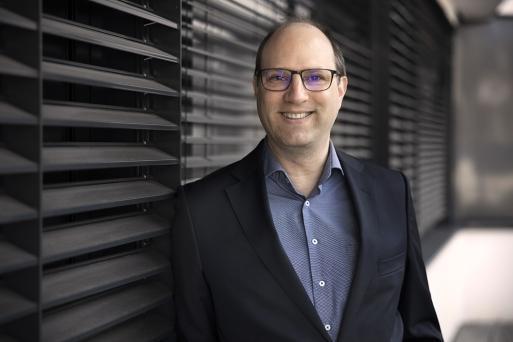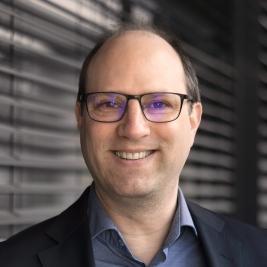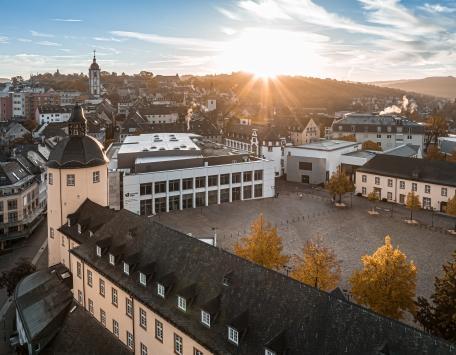Psychotherapy for Holocaust survivors and war children
Rethinking campus life: creating space for encounters
Psychologist Prof. Dr. Simon Forstmeier explains why the brain "locks away" extreme experiences, how these unprocessed memories resurface decades later - and which therapeutic approaches help to sort out the chaos in the memory.
How do people manage to process the Holocaust - a trauma so unbelievably cruel that outsiders can barely comprehend it? Are there psychological mechanisms or survival strategies that play a special role in this?
Prof. Dr. Simon Forstmeier: A trauma as severe as the Holocaust - or a series of such traumas - overwhelms almost every brain. It cannot process these experiences in the same way as it does with everyday stress. The brain has to "lock away" the experience from consciousness in an emergency. As a result, memories of the experience are stored in the memory in a very fragmented and unprocessed form. This is a survival strategy that is initially useful. The problem, however, is that parts of the unprocessed memory fragments involuntarily enter the consciousness and are experienced as re-experiences (flashbacks, nightmares).
forstmeier_copyright_sascha_huettenhain_webTrauma patients like to explain this phenomenon with a metaphor: Normally, the brain stores memories like neatly sorted clothes in a wardrobe - they are accessible and organized. During the trauma, the memories are not filed in a regular way, but are "thrown into the cupboard" chaotically, without being properly organized. Sometimes the door is slammed shut violently so as not to see the chaos. After the trauma, the cupboard door can suddenly burst open (e.g. due to triggers) and the disordered memory fragments fall out uncontrollably - this corresponds to flashbacks or intrusions. The aim of therapy is to gradually open the "cupboard", look at the memories, sort them out and put them in an understandable order. In this way, they lose their overwhelming power and can be integrated into the life story.
Are traumas, such as the experience of the Holocaust, passed on to children and grandchildren across generations?
Strictly speaking, a trauma cannot be passed on to the next generation in the sense that the trauma is then burned into the children's memories. What is passed on are neurobiological changes (higher susceptibility to stress) and unfavorable behavioral patterns (e.g. tendency to react to challenges with fear or sadness, tendency to emotionally distance oneself from other people). It will help to understand these neurobiological and emotional "inheritances" and to practice new ways of reacting.
rose_webWhich psychotherapeutic approaches best help Holocaust survivors and their descendants to deal with trauma? Are there forms of therapy that have proven to be particularly effective - and why?
In principle, all scientifically proven psychotherapies can help Holocaust survivors and their descendants - especially behavioral therapy and psychodynamic approaches. So far, however, there has only been one randomized controlled trial - the highest form of psychotherapy research - specifically with Holocaust survivors: our study on life review therapy for people with multiple traumas (https://doi.org/10.1002/jts.22933). This involves looking at the lives of those affected in a structured way - including positive experiences - and working specifically on the traumatic experiences. In the study, we were able to significantly alleviate the symptoms of post-traumatic stress disorder (PTSD). One reason for the effectiveness is presumably that the stressful memories are better organized and embedded in the life story. At the same time, positive experiences and personal strengths are emphasized, which leads to a more balanced view of one's own life.
You worked in Israel with therapists who treat Holocaust survivors - as a German. How were you perceived there? Were there moments when your own background created a special dynamic in the conversations?
For me, this was also emotionally significant research because it enabled me to contribute to Germany's attempts to at least partially make amends for the injustice done to the Jews. At the same time, I was deeply moved by the therapists' willingness to learn from a German. That is not a matter of course. At the end of a supervision session with the therapists, someone expressed gratitude and that it was emotionally very meaningful for them that a German was now trying to help alleviate the suffering of Holocaust survivors.
What profound psychological traces did the Second World War leave on those who had to experience it as children in Germany? Are there typical patterns of late effects that only become visible decades later?
Possible long-term consequences of war traumatization in childhood are: increased anxiety and stress reactions, more emotional distance in relationships, psychosomatic complaints (e.g. chronic pain, gastrointestinal disorders, cardiovascular problems), and post-traumatic stress disorder (PTSD) or depression occurring later.
There are different courses after experiencing war traumatization: (1) Some develop a mental disorder immediately after the trauma, which remains more or less chronic throughout their lives. (2) Some develop a mental disorder immediately after the trauma, but the symptoms - with or without therapy - become less severe in the course of life, so that someone feels healthy today. (3) Some develop few symptoms immediately after the trauma, are somehow able to cope, but as life goes on they get worse, resulting in a "delayed" mental disorder. And (4) some do not develop any symptoms after the trauma and do not develop any throughout their lives. The last of these is a particularly impressive example of the human capacity for resilience - personal and social resources that help us to cope with stress.
mahnmal_webHow does a childhood in war shape political thinking in old age? Are there connections between early war experiences and today's attitudes towards peace, security and war?
Just as there are different psychological consequences, different political conclusions can also be drawn. Some develop a deeply rooted peace ethic, while others emphasize security and military deterrence. Some develop a distrust of political institutions: Those who experienced systems collapsing as children are often more skeptical of authority. Many former war children are involved in peace initiatives or memorial projects.
Many former war children only talk about their experiences in old age - why does the
silence only begin to falter later? What psychological or social factors prevent those affected from seeking help for decades?
Many former war children only begin to talk about their experiences in old age, for a variety of reasons. (1) In the post-war period, everyday life had to be coped with - there was no room for dealing with trauma. Repression was a survival strategy. (2) The transition to retirement, the loss of relatives, physical illness or other life events can reactivate old traumas. They are then talked about today. (3) In the case of dementia, many people begin to relive traumatic memories in old age because cognitive control mechanisms weaken. (4) In old age, many feel the responsibility to record their experiences for future generations. They want to pass on a legacy as contemporary witnesses.
Photo credit
Portrait: Sascha Hüttenhain


